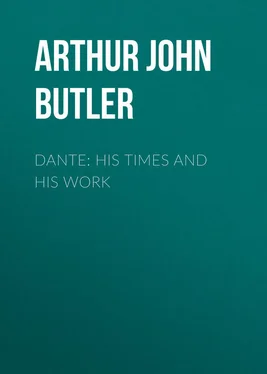Arthur Butler - Dante - His Times and His Work
Здесь есть возможность читать онлайн «Arthur Butler - Dante - His Times and His Work» — ознакомительный отрывок электронной книги совершенно бесплатно, а после прочтения отрывка купить полную версию. В некоторых случаях можно слушать аудио, скачать через торрент в формате fb2 и присутствует краткое содержание. Жанр: foreign_antique, foreign_prose, на английском языке. Описание произведения, (предисловие) а так же отзывы посетителей доступны на портале библиотеки ЛибКат.
- Название:Dante: His Times and His Work
- Автор:
- Жанр:
- Год:неизвестен
- ISBN:нет данных
- Рейтинг книги:3 / 5. Голосов: 1
-
Избранное:Добавить в избранное
- Отзывы:
-
Ваша оценка:
- 60
- 1
- 2
- 3
- 4
- 5
Dante: His Times and His Work: краткое содержание, описание и аннотация
Предлагаем к чтению аннотацию, описание, краткое содержание или предисловие (зависит от того, что написал сам автор книги «Dante: His Times and His Work»). Если вы не нашли необходимую информацию о книге — напишите в комментариях, мы постараемся отыскать её.
Dante: His Times and His Work — читать онлайн ознакомительный отрывок
Ниже представлен текст книги, разбитый по страницам. Система сохранения места последней прочитанной страницы, позволяет с удобством читать онлайн бесплатно книгу «Dante: His Times and His Work», без необходимости каждый раз заново искать на чём Вы остановились. Поставьте закладку, и сможете в любой момент перейти на страницу, на которой закончили чтение.
Интервал:
Закладка:
We have now reached the first date, it may be said, which students of Dante will have to remember; a date which to him, and equally to the sober chronicler Villani, marked the beginning of troubles for the city which both loved as a mother, though to the greater son she was “a mother of small love.” The occasion is so important that it ought to be related in the historian’s own words: —
“In the year of Christ 1215, one Messer Bondelmonte, of the Bondelmonti, a noble citizen of Florence, having promised to take to wife a damsel of the house of the Amidei, honourable and noble citizens; as this Messer Bondelmonte, who was a gay and handsome cavalier, was riding through the city, a lady of the Donati family called to him, speaking evil of the lady who had been promised to him, how that she was not fair nor fitting for him, and saying: ‘I have kept my daughter here for you,’ showed him the maiden; and she was very fair. And straightway falling enamoured of her, he gave her his troth, and espoused her to wife; for which cause the kinsfolk of the first promised lady gathered together, and being grieved for the shame that Messer Bondelmonte had wrought them, they took on them the accursed quarrel whereby the city of Florence was laid waste and broken up. For many houses of the nobles 11bound themselves together by an oath to do a shame to the aforesaid Bondelmonte in vengeance for those injuries. And as they were in council among themselves in what fashion they should bring him down, Mosca of the Lamberti said the ill word: “A thing done hath an end,” meaning that he should be slain. 12And so it came to pass; for on the morning of Easter Day they assembled in the house of the Amidei by St. Stephen’s, and the said Messer Bondelmonte, coming from beyond Arno, nobly clad in new white clothes, and riding on a white palfrey, when he reached the hither end of the Old Bridge, just by the pillar where was the image of Mars, was thrown from his horse by Schiatta of the Uberti, 13and by Mosca Lamberti and Lambertuccio of the Amidei assailed and wounded, and his throat was cut and an end made of him by Oderigo Fifanti; and one of the counts from Gangalandi was with them. For the which thing’s sake the city flew to arms and uproar, and this death of Messer Bondelmonte was the cause and beginning of the accursed Guelf and Ghibeline parties in Florence, albeit that before this the factions among the nobles of the city had been plenty, and there had been the parties I have said, by reason of the conflicts and questions between the Church and the Empire; but through the death of Messer Bondelmonte all the families of the nobles and other citizens of Florence took sides with them, and some held with the Bondelmonti, who took the Guelf side and were its leaders, and others with the Uberti, who were head of the Ghibelines. Whence followed much havoc and ruin to our city, and one may think that it will never have an end if God put not a term to it.” 14
The historian proceeds to enumerate the noble families who joined either side. Curiously enough, they were at first evenly divided – thirty-eight to thirty-eight. Not much is to be inferred from the names, though it is somewhat significant that of those, some half a dozen families in all, whom Villani, himself a Guelf, notes as having only recently attained to nobility, all joined the Guelf party. There seems also to have been a tendency for Ghibeline houses to become Guelf, which is not balanced by any defections in the opposite sense, so that the balance of parties was soon disturbed in favour of the Guelfs. At first, however, though “there was a division among the nobles of the city in that one loved the lordship of the Church, and the other that of the Empire, yet in regard to the state and welfare of the commonwealth all were in concord.”
This state of things did not last long. In 1220 Frederick II. was crowned Emperor at Rome. Up till that time he had been more or less a protégé of the Popes. First Innocent III., then Honorius III., had kept a fatherly eye upon his youth and early manhood, and for a time Church and Empire seemed to pull together. Honorius had, indeed, occasion to write severely to him more than once, but there was no breach of the peace. The accession of Gregory IX., in 1227, changed the aspect of affairs. Before the year was out, Frederick, like most of his predecessors for 200 years past, was under the ban of the Church: and from this time forward there was an end of peace and quiet government in Northern Italy. “Before Frederick met with opposition,” Dante makes a Lombard gentleman of the last generation say, “valour and courtesy were wont to be found in the land which Adige and Po water; now may any man safely go that way, who through shame has left off to converse with good men or approach them.” 15
Florence seems to have remained longer than most of the chief cities aloof from the main contest. She had her own wars with Pisa, beginning with a private quarrel at the Emperor’s coronation (in which we are expressly told that both parties united), and afterwards with Siena; and the great houses did a certain amount of private fighting; “but still the people and commonwealth of Florence continued in unity, to the welfare and honour and stability of the republic.” In 1248, however, Frederick turned his attention in that direction, moved, it may be, by the growing strength of the Guelfs. His natural son, Frederick of Antioch, was sent with a force of German men-at-arms, and after some fierce street fighting, the Guelfs were driven out.
The Ghibeline supremacy was short-lived. Their nobles, especially the great house of the Uberti, became unpopular by reason of the exactions which they enforced; they got beaten in a fight with some of the banished Guelfs at no great distance from the city; and before the end of 1250 a meeting of “the good men,” as Villani calls them, or, as we should say, the middle class, limited the power of the Podestà, 16and appointed a Captain of the People to manage the internal affairs of the city, with a council of twelve Elders. Other important changes were made at the same time, and the new constitution – the third recorded in Florentine history – was known as the “Primo Popolo.” The death of Frederick in the same year still further weakened the Ghibelines. Some of them were banished, and the exiled Guelfs were recalled. Peace, however, seems to have been kept between the parties for some time, and when in 1255 Count Guido Guerra on his own account expelled the Ghibelines from Arezzo, the Florentines restored them, and lent the Aretines money to pay a fine which the Guelf chief had inflicted; “but I know not if they ever got it back,” says Villani.
Again the compromise proved unstable. Manfred, Frederick’s natural son, to whom, during the childhood of his young nephew, Conradin, the championship of the Hohenstaufen cause had fallen, was daily increasing in strength. His orders came to the Ghibelines of Florence to crush the popular party; and the latter, being warned in time, drove out all the great Ghibeline families. Two years later these had their revenge. On September 4, 1260, a date much to be remembered in the history of these times, the banished Ghibelines, aided by eight hundred of Manfred’s German horse, seized the opportunity of hostilities between the Florentines and the Sienese to meet their opponents in a pitched battle. This took place on the Arbia, near the fortress of Montaperti, to the east of Siena. 17The Guelfs were utterly routed, partly, it would seem, through the incompetence of some of the Elders who accompanied the army, and who, civilians though they were, overruled the judgement of the military leaders, and accepted battle under unfavourable conditions; and partly through the treachery of some Ghibelines who, not having been exiled, were serving in the Florentine host. Readers of the Commedia will remember the name of Bocca degli Abati, placed by Dante in the lowest pit of hell. 18
Читать дальшеИнтервал:
Закладка:
Похожие книги на «Dante: His Times and His Work»
Представляем Вашему вниманию похожие книги на «Dante: His Times and His Work» списком для выбора. Мы отобрали схожую по названию и смыслу литературу в надежде предоставить читателям больше вариантов отыскать новые, интересные, ещё непрочитанные произведения.
Обсуждение, отзывы о книге «Dante: His Times and His Work» и просто собственные мнения читателей. Оставьте ваши комментарии, напишите, что Вы думаете о произведении, его смысле или главных героях. Укажите что конкретно понравилось, а что нет, и почему Вы так считаете.




![William Frith - John Leech, His Life and Work. Vol. 1 [of 2]](/books/747171/william-frith-john-leech-his-life-and-work-vol-thumb.webp)
![William Frith - John Leech, His Life and Work, Vol. 2 [of 2]](/books/748201/william-frith-john-leech-his-life-and-work-vol-thumb.webp)





